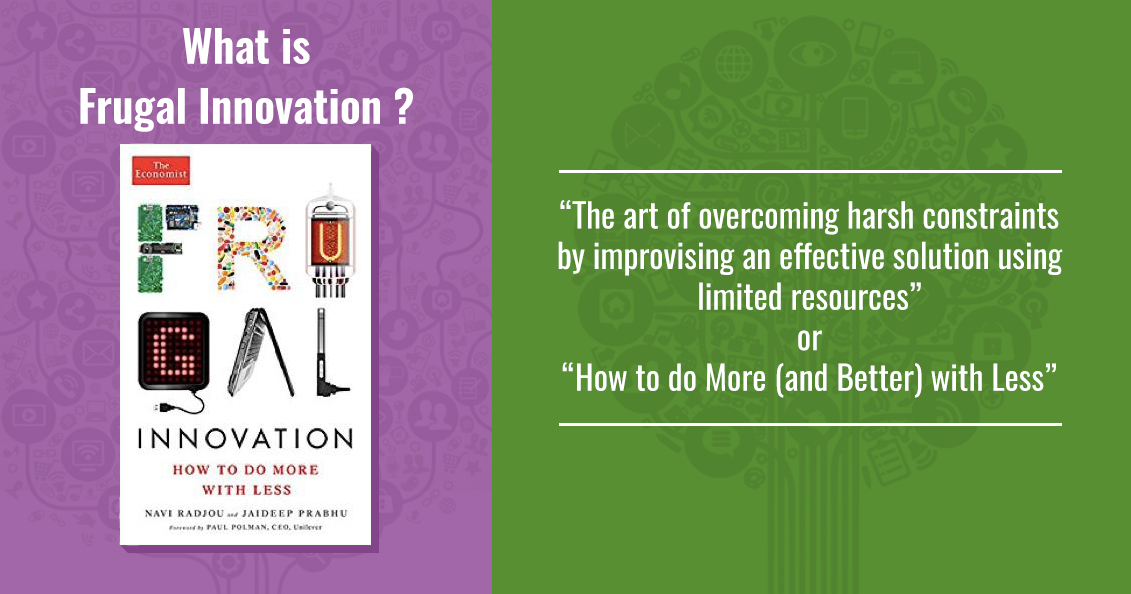Introducing the Frugal approach to Technology Innovation in Enterprises

In the following 3-part blog series, the aim is to impart a basic knowledge of what “frugal innovation” actually stands for and what it means in an enterprises’ context. The next two blogs will talk about the principles that guide frugal innovators and why enterprise CIOs must take a closer look at the possibilities of frugal innovation.
“Frugal Innovation” is defined as the art of overcoming harsh constraints and innovating sustainable products with limited resources. As a concept, it is not new and has been around for at least a decade, largely prevailing in the socio-economic context of developing countries like India, Kenya, Brazil, and China, where we have seen examples of frugal innovation by grassroots entrepreneurs to multinationals across sectors. At the grassroots end, examples include clay refrigerators used to store vegetables in rural areas where the lack of electricity is a constraint to baby warmers designed to help premature babies maintain their body temperature and preserve their lives. At the multinational end, pioneers of frugal innovation include the likes of GE, Siemens and Renault-Nissan, who have built low-cost solutions overcoming the constraints of energy and environmental challenges.
Frugal Innovation creates value for Individuals, Businesses & Society
Frugal Innovation begins with identifying opportunities that arise from adversity. Innovative minds reframe problems and convert them into opportunities. Maximum effort is made to flex available assets and convert them into sustainable solutions appropriate to the problem, the situation and the end user. Frugal innovation, therefore, unleashes the creativity in individuals and helps them to do more and better with less. Frugal innovation is thus also geared towards creating value for individuals, business, and society through the efficient use of available resources.
Because of the transformative power of the concept, I have been researching it along with co-authors for over a decade now. In 2012, along with Navi Radjou, an innovation guru and winner of the Thinkers50 Innovation Award, and Simone Ahuja, a film-maker and consultant, I wrote Jugaad Innovation, a bestselling book about frugal innovation in emerging markets and what large Western corporations can learn from their emerging market counterparts. Hailed by the Economist as ‘the most comprehensive book yet to appear on the subject of Frugal Innovation’, the concept of frugal innovation attracted a lot of attention in the West for the West. So, Navi Radjou and I then went on to publish a follow-up book called Frugal Innovation: How to Do More with Less that focused specifically on frugal innovation in developed economies in the 21st century. In the book, we look at large companies such as Unilever, Renault, GE, Siemens, GSK, and others that are using the frugal principles to drive innovation in resource-constraint environments globally.
Frugal Technology Innovation for Enterprises
Over the last decade or so, we have seen a tremendous explosion of frugal innovation in various socio-economic contexts. Now an interesting question arises: can frugal innovation be applied to bring technology innovation to enterprises?
Ignitho has taken the bold, pioneering step of adapting this concept to drive Frugal Technology Innovation for Enterprises. I have been collaborating closely with Joseph Olassa, co-founder and CEO of Ignitho, to actively promote Frugal Technology Innovation for Enterprises in the US and UK markets. Joseph has been a leading advocate of this approach and has presented his ideas at various global conferences.
Combining my research on frugal innovation with Joseph’s expertise in technology innovation, Ignitho and I have successfully developed a frugal methodology to rapidly prototype business ideas and scale technology innovation in enterprises facing time and resource constraints. Ignitho’s disruptive new approach can help unlock efficiencies to innovate using available resources (money, time, people), to deliver tangible outcomes for the business using technology.
If the concept of Frugal Technology Innovation interests you, stay tuned for my next blog which talks about the principles guiding Frugal Innovators and how they can lead enterprises to achieve successful Technology Innovation.